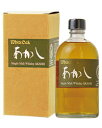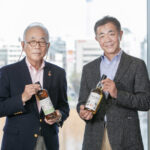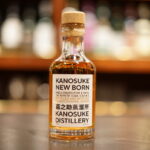Akashi is a brand of whisky produced by the Eigashima Sake Brewery, which produces a variety of alcoholic beverages including sake, wine and brandy.
The name “Akashi” is derived from the city of Akashi, Hyogo Prefecture, where the brand was born.
The company is also known as the brewer of “Kamitaka” sake, and also produces Western-style liquors such as “White Oak Whisky” blended whisky, “Charman Brandy” and “Charman Wine” .
Since around 2011, the company has also been focusing on overseas exports, and is particularly popular in France, with 90,000 bottles exported.
This cask series is a great value lineup that is cosmetically pleasing, accessible yet special.
1. Manufacturer
Eigashima Sake Brewery
| Established | May, 1888 |
| Head office location | 919 Nishijima, Okubo-cho, Akashi, Hyogo 674-0065, Japan |
| Owned distillery | Eigashima distillery (former White Oak distillery) |
2. Distillery
Eigashima distillery
| Address | 919 Nishijima, Okubo-cho, Akashi, Hyogo 674-0065, Japan |
| Start of operation | 1919 |
1891: the shochu storehouse “Nibangura” was completed *It later became a whisky storehouse.
1919: Obtained a whisky license and established a distillery.
In the same year, a local whisky “White Oak” was released.
1984: New distillery completed.
2007: First single malt whisky “Akashi” 8 years old released.
Akashi is made at the White Oak Distillery in Eigashima, Akashi City, Hyogo Prefecture.
The name of the distillery is now changed to Eigashima Distillery in order to make it easier to understand for foreign tourists.
The distillery is famous for being the closest distillery to the sea in Japan and is also the westernmost single malt whisky distillery in Japan.
As a small fishing village, Eigashima enjoys a pleasant climate throughout the year and benefits from a warm oceanic climate right next to the Akashi Strait in the inland sea.
A license to produce whisky and wine was obtained in 1919.
The first distillation of whisky in Japan took place at the Yamazaki Distillery in 1923, but it was the Eigashima Distillery (formerly the White Oak Distillery) that received the first patent for whisky distillation in Japan in 1919.
In 1919, Masataka Taketsuru, the father of Japanese whisky, went to Scotland to learn about whisky distilling.
It is amazing that the White Oak Distillery existed at such an early stage.
However, although the patent was obtained, the correct method of whisky making was not handed down, and it is said that what was being made at that time was imitation whisky.
Reference: White Oak Distillery official website
See also this ↓ for more information on White Oak Distillery.
https://jpwhisky.net/japanesedistillery-1447/#1-2″]
3. Product name and photo
White Oak Local whisky Akashi
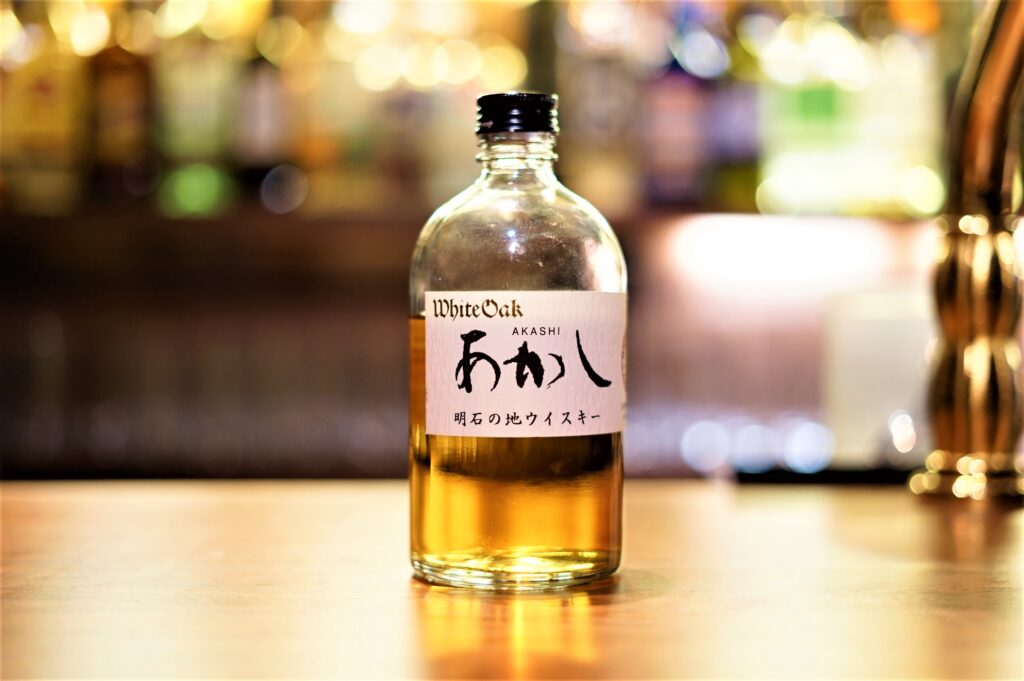
4. Characteristics
Gorgeous malt aroma. Light and slightly dry. Easy to drink local whisky.
This is a Scotch-type blended whisky made from 100% English malt, with a sweet aroma and smooth mouthfeel produced by continuous distillation. This is a local whisky from Akashi with a gorgeous malt aroma and a light, slightly dry taste that is easy to drink. It is best served on the rocks or in a highball.
When you pour it into a glass and smell the aroma, you will feel the strong stimulation of alcohol, but from the back of the glass, you will feel an aroma similar to that of toasted bread.
On the palate, the aroma becomes stronger, with sweet notes of rum raisins and barley chocolate.
The taste is generally sweet and not too harsh, even straight.
On the rocks, as the water is added, the smokiness of the peat begins to spread and the taste becomes more complex with the addition of acidity. In fact, the more water is added, the more satisfying the drink becomes.
4-1. Tasting Notes
| Aroma |
Aroma of rum raisins and toasted bread. Smokiness comes out when water is added. |
| Taste | Sweet overall. Sourness comes out when water is added. Nutty and rich. |
| Aftertaste | Clean and short aftertaste. |
4-2. Product Specifications
| Alcohol content | 40% |
| Classification | Blended |
| Barrel type | Barrel type |
| Contents | 500ml |
| Number of bottles sold | Number of bottles sold |
| Suggested retail price | 1,210 yen (tax included) |
| Release date | Release date |
5. Awards
No awards have been received at this time.
6. Price
6-1. Manufacturer’s suggested retail price
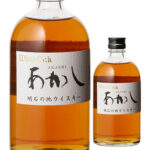
| Product name | White Oak Akashi |
| Volume | 500ml |
| Suggested retail price | 1,210 yen (tax included) |
6-2. Resale price on Mercari
The resale price on Mercari is Around 2,000 yen The price is as follows. (*As of April 19, 2021)
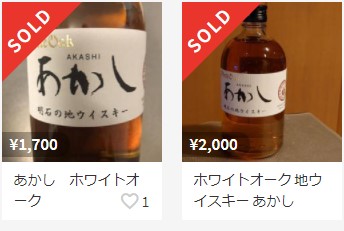
6-3. Yahoo auction bidding price
The price on Yahoo Auction is Lowest bidder: 900 yen, highest bidder: 1,755 yen, average bidder: 1,242 yen (*as of April 19, 2021)
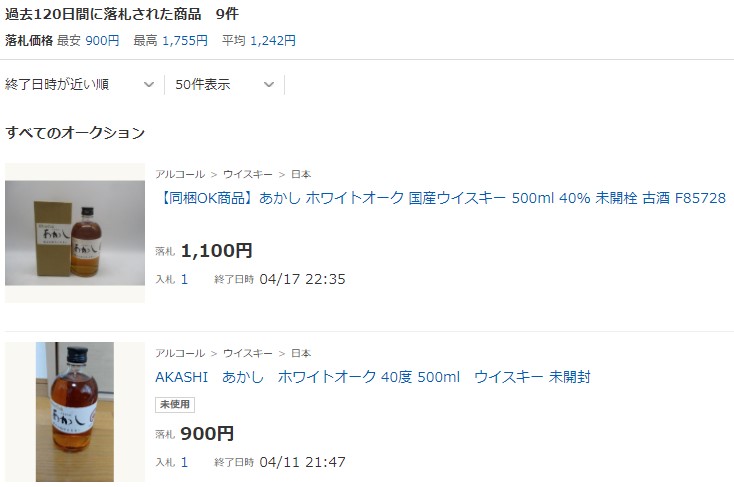
6-4. Rakuten, Yahoo Shopping, Amazon
It is also sold at Around 1,000 yen to 1,200 yen. (*as of April 19, 2021)
6-5. Price offered at BAR Shinkai
At “BAR SHINKAI” , which is operated by this site, it is offered at 1 cup, 45 ml: 880 yen.(*as of 4/19/2021)
https://en.jpwhisky.net/about-2/barshinkai-4/
7. Summary
It is characterized by a mouthfeel that is easy to sip. If you enjoy it on the rocks, the ripe fruit-like aroma and rich, mild sweetness will stand out even more.
Even if you drink it as a highball, the impression will not be weakened. You will be able to fully enjoy the unique character of Akashi, which has a core of freshness.
Akashi is a unique local whisky made by Eigajima Shuzo, which has adopted the traditional methods of Japanese sake while maintaining the authentic Scotch style. It is a whisky that will satisfy even the most discerning whisky connoisseur.
Please check out our other articles on Akashi.
https://jpwhisky.net/singlemalt-akashi-4year-sakecask-5642/
https://jpwhisky.net/singlemalt-akashi-3year-tequilacask-3386/
Lastly: Recommended Books on Japanese Whisky
If you want to learn more about Japanese whisky, which is a global trend, we highly recommend these books.
(1).Whisky Galore Vol.29 December 2021 issue
In the December 2021 issue of Whisky Galore, published by the Whisky Culture Research Institute, we report on 11 Japanese craft distilleries, including some that are open to the public for the first time, under the title of “Japanese Whisky Craft Frontline,” the first of three consecutive issues. Why did the popularity of Japanese whisky and the craft boom occur? We will examine with interviews. Chichibu Distillery / Chichibu No.2 Distillery / Mars Shinshu Distillery / Mars Tsunuki Distillery / Kanosuke Distillery / Hioki Distillery / Ontake Distillery / Osuzuyama Distillery / Kaikyo Distillery / Hanyu Distillery / Konosu Distillery
(2). Japanese Whisky as an Education for Business
This is a book written by Mamoru Tsuchiya, a world-famous whisky critic and representative of the Whisky Culture Research Institute, titled “Japanese Whisky as a Culture that Works for Business” .
The book covers the basics of whisky, the introduction of whisky to Japan, the birth of Japanese whisky, advertising strategies and the rise of Japanese whisky, and the current rise of craft distilleries. This is a book that summarizes Japanese whisky in a very easy to understand way.
(3). Whisky and I (Masataka Taketsuru)
Masataka Taketsuru, the founder of Nikka Whisky, devoted his life to brewing whisky in Japan. This is a revised and reprinted version of the autobiography of a man who simply loved whisky and talked about himself. The book vividly depicts the days when he went to Scotland alone to study as a young man and overcame many hardships to complete Japanese whisky, as well as his companion, Rita.
(4). A Letter of Challenge from a New Generation Distillery
Launching in 2019. With the world experiencing an unprecedented whisky boom, what were the managers of craft distilleries thinking and what were their thoughts as they took on the challenge of making whisky? This book tells the stories of 13 craft distillery owners, including Ichiro Hido of Venture Whisky, famous for his Ichirose Malt, who inspired the birth of craft distilleries in Japan.
(5). Whiskey Rising
This is the Japanese version of Whisky Risng, published in the US in 2016, with much updated content. Not only does it describe the history of Japanese whisky in detail, but it also includes data on all the distilleries in Japan, including the craft distilleries that have been founded in recent years. The book also includes descriptions of the legendary bottles that have been released, as well as information on bars where Japanese whisky can be found.


